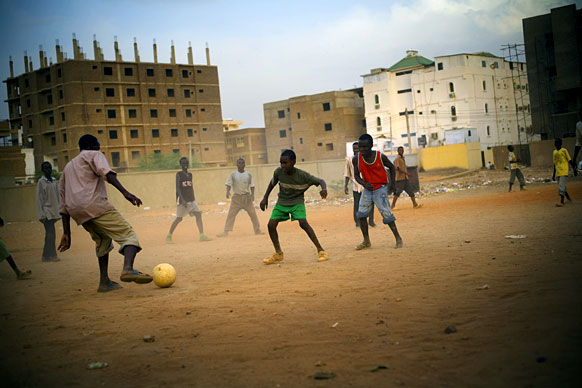Language. In Sudan, people speak Arabic and English and other dialects like Nilotic, Nilo-Hamitic, and Sudanic.
Religion. Most people are Sunni Muslim. 5% of the population are Christians. 25 % follow indigenous beliefs.
Food. Most people like to start there day with a cup of tea or coffee. Their breakfast consists of beans, salad, liver, and bread. Millet is the most common and basic dish. Another common dish is called Ful. Ful is a dish of beans cooked in oil. In the north, people rely on dairy products and meat from camels. Meat is expensive and not often consumed.
 |
| Food for Sudanese Ramadan |
Traditions involving food. Sheep are killed for feasts or to honor a special guest. The intestines, lungs, and liver of the animal are prepared with chili pepper in a special dish called marara. The Feast of the Great Sacrifice, or as people of Sudan call it Eid al-Adha. A sheep is killed and part of the meat is given to people who cannot afford to buy one. The Eid al-Fitr, or Breaking of the Ramadan Fast, is a large family meal. Prophet Muhammad's birthday is another holiday but it's more for children'sbecause it involves preparating special desserts like pink sugar dolls and sticky sweets made from nuts and sesame seeds.
Marriages. Marriages are traditionally arranged by the parents. This tradition is still done by poor and wealthy Sudanese. Marriages are often between cousins,other family member or between members of the same tribe and social class. The bride and groom usually have not seen each other before the wedding. The woman is expected to be a virgin. A man must be economically self-sufficient and able to provide for a family before he can marry. Middle class women usually get married after they finish school. For people of lower social classes the age is even younger. Divorce is more common now but its still considered shameful. The legal age for marriage is 18, but many Sudanese don't follow this law. Homosexuality is illegal in Sudan.
 |
| Sudanese wedding! Observe all the pretty jewelry the woman is wearing. |
Etiquette. Any kind of greeting involves the use of their religion. Some common greetings are "Insha Allah", which means it's Allah will and "alhamdu lillah", which means may Allah be praised.In Sudan, instead of using utensils the common thing is to use your right hand (hands are washed before eating!) or to use a piece of bread for dipping.
Music and Dance. Sudanese enjoy listening and dancing to music. Music and dance are also an important part in religion. Signing, dancing, and the use of drums are always done in any kind of celebration. Through dance Sudanese sometimes act out verses from the Quran. Sudan has many Arabic influences, so belly dances are performed too.
In this video, Sudanese people sing and dance to God about their problems,but still with a positive attitude.
Art. Sudanese art is very colorful. Some artists express their dual African and Islamic identities throughout their art. Calligraphy is an important part of their art too.
Clothes. Men wear trousers and a shirt for professional workplaces. Sudanese men preferably like to wear the traditional jalabiya or long pastel-colored robes and the tagia or like a small hat. Out-door working men wear baggy pants.Woman have to be covered from head to toe by common Islamic dresses. Cross dressing is illegal and if someone does it they are publicly beaten.
Sports. Sudanese people LOVE soccer! It is the most common sport played because it is played both by the upper and lower social classes.
Additional Sudanese Culture
More Sudan Culture
Sudan Culture
Sports. Sudanese people LOVE soccer! It is the most common sport played because it is played both by the upper and lower social classes.
Additional Sudanese Culture
More Sudan Culture
Sudan Culture

No hay comentarios:
Publicar un comentario